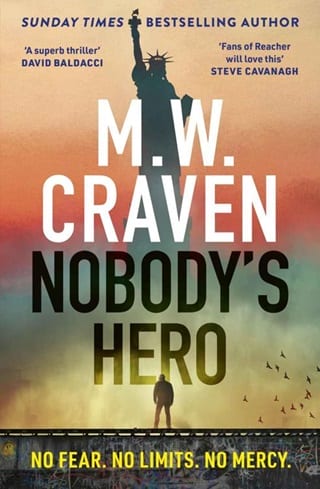Chapter 51
Chapter 51
‘Acacia Avenue was the code name for your Future Threat Disruption think tank?’ Koenig said.
‘It was,’ Carlyle confirmed. ‘I don’t know why, but each year’s event was code-named after the address at which it was going to take place.’
‘And two months later you faked your own death.’
‘I did.’
‘I won’t ask why. I know why.’
‘I’m not sure I do,’ Draper said.
‘Bess grabbed the third rail,’ Koenig said. ‘She mentioned Rumsfeld’s known knowns and his known unknowns, but she didn’t mention the one that keeps everyone awake at night: the unknown unknowns. The threats we don’t even know exist. Bess’s think tank identified a threat so terrifying it immediately became a threat to our national security. She found Pandora’s box.’
‘Yes, thanks for the mansplaining,’ Draper said. ‘I’m ex-CIA, and more importantly I’m not a fucking moron. I understood that part.’
‘What then?’
‘She faked her death to protect this monstrous knowledge, this Pandora’s box, she’d unwittingly come into possession of, yes? Yet despite there being twenty people at this think tank, she was the only one who had to disappear. Why was that?’
Koenig frowned. Draper was right. Either everyone disappeared or no one disappeared. It didn’t matter if it was one black sock or twenty in with the whites; the result was still grey laundry. They were missing something.
‘I was a lieutenant commander in the navy’s Irregular Warfare Center,’ Carlyle said. ‘But I was never ambitious in the way some of my colleagues were. Getting promoted out of my current job was never more important than doing my current job.’ She took a moment, then added, ‘Do you know what undirected research is?’
‘Research that doesn’t have a preordained result,’ Koenig said. ‘The research itself dictates the direction it takes.’
‘I studied counterterrorism at college. Did you know that until the 1970s, the IRA was conventionally structured in companies, battalions and brigades? But because they were easy for the Brits to infiltrate, they moved to clandestine cells called active service units.’
Draper and Koenig both nodded. The SAS guys Koenig knew all had tales about what they had done in Northern Ireland. Koenig thought they’d rather enjoyed it. And he figured that Draper, as ex-CIA, probably had a working knowledge of all major terrorist organisations.
‘Because I didn’t know what threat we would identify, if any, I was sure as hell going to take security precautions,’ Carlyle continued. ‘The people at my think tank weren’t military. Some, like Margaret, weren’t even US citizens. They were a brilliant, eclectic bunch, each with a different area of expertise, but they were also eccentric and scatterbrained. In other words, they were a security nightmare. So, I put them in silos. Time slots, really. Some were there for a day or two, some only an hour. No one attended the full event. I kept it compartmentalised. At the end of the week, only I had the full picture. Some knew the broad strokes; others were intimately involved in specific parts without knowing what they were working on. I was the only one who understood that the whole was so much greater than the sum of its parts.’ She held their eyes. ‘That’s why I had to die.’
 Fullepub
Fullepub 



